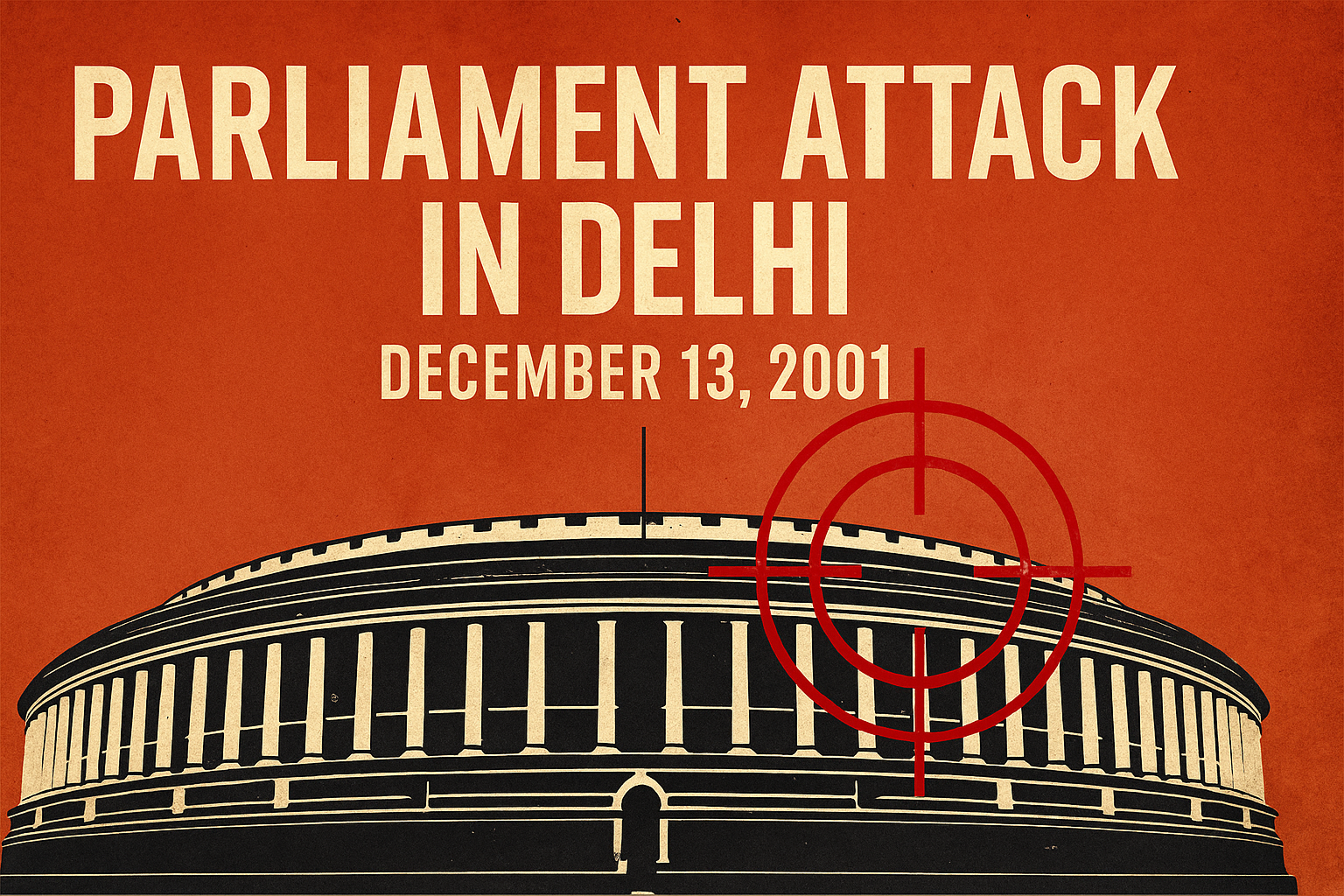Introduction: When Terror Struck the Heart of Democracy
The Parliament attack Delhi on December 13, 2001, remains one of the most horrifying incidents in modern Indian history. What was meant to be a routine day at the Indian Parliament turned into a battlefield, marking it as the 2001 terror attack that shook the entire nation.
This Indian Parliament attack wasn't just a physical assault but a symbolic one—targeting the very foundation of India’s democratic structure.
Timeline of the 2001 Terror Attack
On that cold December morning, five armed militants, affiliated with Lashkar-e-Taiba and Jaish-e-Mohammed, drove a car with forged Home Ministry decals straight into the Indian Parliament premises. They launched a surprise assault at 11:30 AM, firing automatic rifles and using grenades.
This 2001 terror attack led to a deadly 30-minute gunfight. Had they succeeded, it could have resulted in the loss of top Indian political figures.
Casualties and Brave Sacrifices
During the Indian Parliament attack, nine individuals lost their lives—six Delhi Police personnel, two Parliament staffers, and a gardener. All five terrorists were neutralized before they could reach the main chamber.
The attack was a reminder of a critical Indian security breach, raising concerns about how terrorists could get so close to the center of Indian power.
Who Were the Masterminds?
The investigation pointed directly to Pakistan-based terror organizations, Lashkar-e-Taiba and Jaish-e-Mohammed. These groups have long been accused of orchestrating violent acts against India.
The most controversial figure tied to the attack was Afzal Guru. Found guilty of aiding the terrorists, he was sentenced to death. His hanging in 2013—known as the Afzal Guru execution—sparked nationwide debate. Some saw it as justice served, while others questioned the legal process and transparency.
Security Lessons and Reforms
This massive Indian security breach forced the Indian government to revisit its approach to protecting national institutions. The Parliament attack Delhi became a catalyst for security upgrades:
Bullet-proof bunkers
High-definition surveillance
Multiple identity checks
Restricted vehicle access zones
The goal was simple—prevent another 2001 terror attack of such magnitude.
Political Fallout and Operation Parakram
The Indian Parliament attack had international consequences. India launched Operation Parakram, deploying troops along the Pakistan border. It brought the two nuclear-armed nations to the brink of war.
Diplomatic relations with Pakistan deteriorated, especially since the attackers were linked to Lashkar-e-Taiba and Jaish-e-Mohammed—groups India has consistently accused Pakistan of sheltering.

Media Coverage and Public Reaction
The Parliament attack Delhi dominated headlines for months. Live footage of gunfire and chaos highlighted the gravity of the Indian security breach. The public was outraged, and political unity was seen across party lines.
The Afzal Guru execution reignited debate, with citizens divided on the moral and legal angles. Nonetheless, the attack left a permanent mark on Indian consciousness.
Legacy of the 2001 Parliament Attack
Every year on December 13, tributes are paid to those who died protecting Parliament. The 2001 terror attack is not just a historic event—it's a constant reminder of the threat posed by terrorism.
The Indian Parliament attack reinforced the need for constant vigilance, intelligence coordination, and swift response systems.
Read More: Biggest Tax Raid In India | Black Money, GST Frauds, and Piyush Jain
Conclusion
The Parliament attack Delhi exposed critical flaws in security but also showcased the bravery of Indian forces. Whether it was the involvement of Lashkar-e-Taiba, Jaish-e-Mohammed, or the legal storm following the Afzal Guru execution, this incident reshaped India’s fight against terrorism.
The Indian security breach was costly, but it served as a turning point—ensuring that the safety of the nation’s lawmakers would never again be taken lightly.
Explore other popular Posts:
Blog | News | Entertainment | Education | Sports |
Technology | Cryptocurrency | Stock | Home | Sitemap





